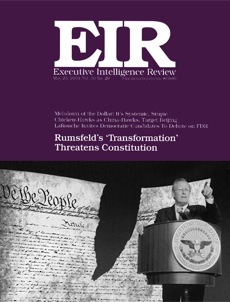Rumsfeld’s ‘Notverordnung’ Still on a Fast Track
by Carl Osgood
The Defense Transformation for the 21st Century Act—compared to the Emergency Decrees that ushered in Hitler’s dictatorship—has encountered Congressional resistance, but not yet enough to stop it.
Why Rumsfeld’s ‘Transformation’ Bill Is Unconstitutional
by Edward Spannaus
The decision of the Framers of the U.S. Constitution to place the Armed Forces under the control of Congress, rather than the Executive branch, was not a matter of extensive debate; there was general agreement that this point was crucial.
Bush Administration ‘Dr. Strangeloves’ Take a Hit
by Jeffrey Steinberg
A bipartisan group of House Armed Services Committee members has blocked the deployment of mini-nuclear weapons, thus stalling the scheme of Vice President Dick Cheney and other “Dr. Strangeloves,” to use them.
Economics
The Meltdown of the Dollar: It’s Systemic, Stupid!
by Lothar Komp
The collapse of the dollar in April, escalating in May, has dramatic consequences for an international financial system that is essentially dollar-denominated.
Only ‘FDR Solution’ Can Stop U.S. States’ Collapse
by Mary Jane Freeman
Germany: Current Policy Can’t Stop Unemployment Rise
by Rainer Apel
Infrastructure Centers Brazil’s New Diplomacy
by Lorenzo Carrasco
South American unity has become Brazil’s number-one foreign policy priority, and the basis for an unprecedented diplomatic offensive to solidify agreements with every country in the region, to implement the Initiative for Regional Infrastructure Integration of South America (IIRSA).
LaRouche Reform of Credit System in the Americas
by Lyndon H. LaRouche, Jr.
FDR Sought Brazil’s Industrialization
by Cynthia R. Rush
Investigation
Chicken-Hawks as China-Hawks: The Straussians Target Beijing
by Michael Billington
The original writings which document the intentions of the utopian faction to use an Iraq War as a means to implement their imperial, pre-emptive war policy, also demonstrate that a primary target—perhaps the primary target—of the policy is China.
Feature
LaRouche in Italy: Take the Lead for Eurasian Development
by Claudio Celani
In Vicenza and Milan, LaRouche met with political and economic leaders, and launched the LaRouche Youth Movement in Italy.
The Precedent of Postwar Reconstruction for Today
by Lyndon H. LaRouche, Jr.
Speech in Vicenza at a conference of the International Strategic Economic and Scientific Institute (ISIES), associated with the Chamber of Commerce.
The Dollar’s Fall, the World Economy’s Future
by Lyndon H. LaRouche, Jr.
From the questions and discussion following LaRouche’s presentation in Vicenza, Italy.
International
Europe’s Anti-War Three Build Bridges With Southeast Asia
by Michael Billington
In resistance to the American turn to unilateralism and pre-emptive warfare, and the collapsing dollar-based financial system, Russia, France, and Germany are looking increasingly to Eurasia-wide infrastructure and technology development projects, as the basis for a new economic order.
Sharon Killing Palestinians To Kill the ‘Road Map’: Will Bush Stop Him?
by Michele Steinberg
The Mission of a City: On the 300th Anniversary of the Founding of St. Petersburg
by Konstantin Cheremnykh
What the Iraq War Hath Wrought
by Muriel Mirak-Weissbach
Report from a conference of the Einstein Forum, in Potsdam, Germany.
Is It Operation ‘Enduring Chaos’?
by Hussein Askary
More than one month after the “liberation” of Iraq, that country and the Middle East region are gazing into a dark abyss.
Chaos in Iraq Food Aid a Disaster for Africa
by Paul Gallagher
Departments
Editorial
Who Is Running Al-Qaeda?
National
LaRouche Invites Democratic Candidates To Debate on FDR
by Nancy Spannaus
Lyndon LaRouche, currently frontrunner in the Democratic race according to leading measures of broad financial support, issued a debate challenge to his nine opponents on May 11, offering a webcast devoted to the topic: “Is the precedent of FDR’s response to Hoover’s 1929-33 Depression, still relevant for today’s crisis? Why, or why not?”
Anti-American Roots of the ‘Leo-Cons’; What the New York Times Won’t Print
by Barbara Boyd
Carl Schmitt, the “Crown Jurist of the Third Reich,” was the intellectual godfather of Leo Strauss, the late University of Chicago professor whose influence in the Bush Administration is hitting the front pages of the world’s press. Today, a Schmitt revival is under way.
Congressional Closeup
by Carl Osgood
Interviews
Sen. Eugene McCarthy
In this, the third and final part of a series of interviews with Senator McCarthy, he discusses how the assassinations of Dr. Martin Luther King, the Kennedy brothers, and other tragic events of the 1960s led to the destruction of the power of reason and optimism, and destroyed the promise of the Baby Boomer generation.
Correction
This 1888 photo of the Camp E.A. Perry yellow fever detention camp in Florida, was inadvertently omitted from “Stopping Disease: The Yellow Fever Case,” in last week’s EIR. To combat the epidemic, persons travelling from yellow fever areas were required to remain in the camp for the incubation period (6-10 days).



